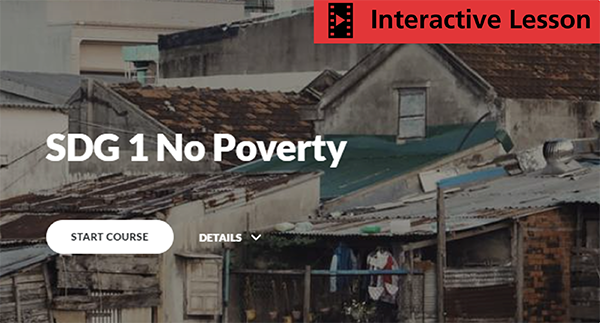End poverty in all its forms everywhere
United Nations (UN) Sustainable Development Goal (SDG) 1: No Poverty
Goal: Demonstrate an understanding of the causes of poverty as evidenced by multiple viewpoints.
Content & Learning Objectives
SDG 1 of the 2030 Agenda is to end poverty in all its forms and everywhere. This lesson is a useful overview of SDG 1. Here we provide the learner with an explanation of the concepts of extreme and relative poverty and an introduction to the causes and impacts of poverty. We provide an overview of the Irish, European and global distribution of extreme poverty and introduce the learner to the main poverty reduction strategies. Click on the image to start the lesson.
Further information & useful links:
- The SDGs in Action app highlights the SDGs in Action,
- The UN including the UN Department of Economic and Social Affairs information on SDG 1,
- SDG Tracker: The UN has defined seven Targets and 14 Indicators for SDG 1. Targets specify the goals and Indicators represent the metrics by which the world aims to track whether these Targets are achieved. This website shows data on the agreed Indicators,
- The Quest to End Poverty: Hear ideas and results from economists, philanthropists, activists working — in labs and on the ground — to wipe it out. Watch these 12 curated talks at Ted Talks.
- On this video of Nasreen Sheikh, an ex-slave and child labourer speaks about the cycle of poverty.
Yes. There is a basic knowledge badge, awarded to anyone who successfully completes the online lesson and quiz. We have also specified the criteria for a badge that is awarded upon demonstration of practical skills. The badges will become available shortly.
Yes. A useful workshop would include ensuring the learners understand the causes and impacts of poverty. It is also worth considering doing a case study on poverty and wealth in selected countries (through desktop research) or developing an enquiry-based project around: “Is poverty increasing or decreasing?”. And reflective work where students get the opportunity to think about what they can do to help bring about positive change.
Yes. There are lots of materials on the web, a number of which are listed above. These are a good starting point.
Yes. We provide all the materials which we have developed (or adapted, subject to licence permissions) for use under a CC BY-NC 4.0 licence. We will shortly be making downloadable SCORM versions available here.

